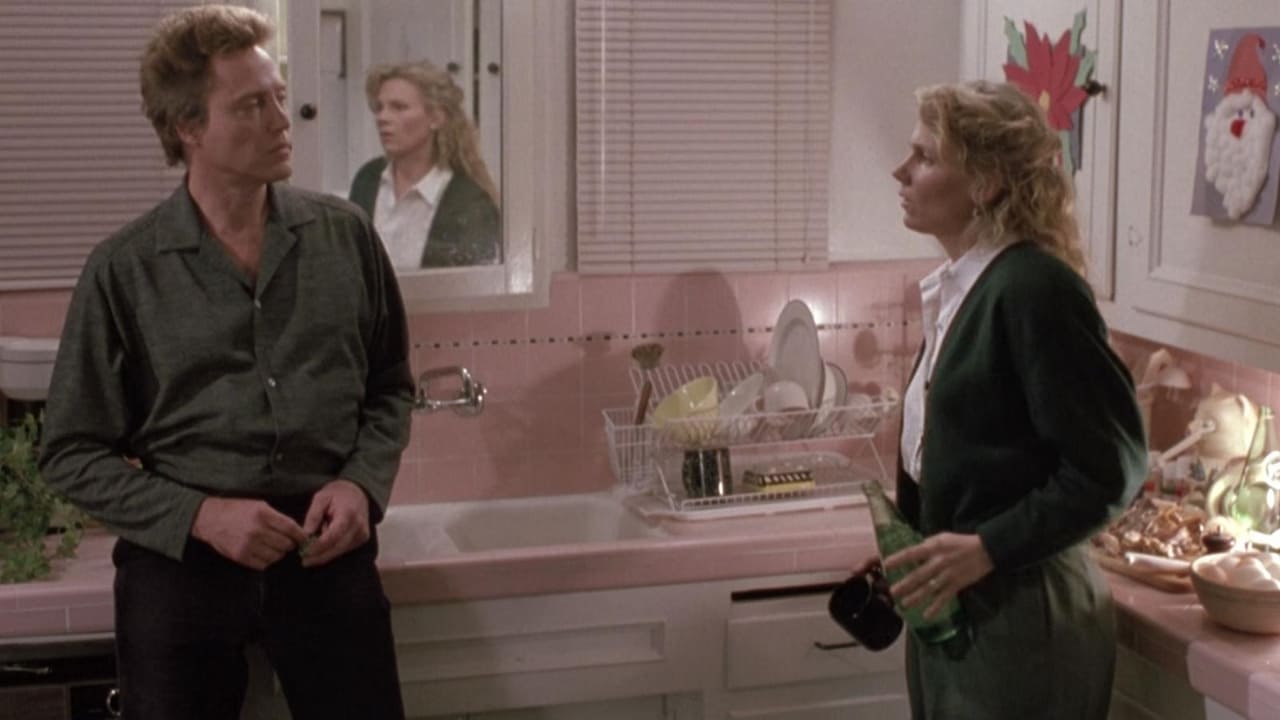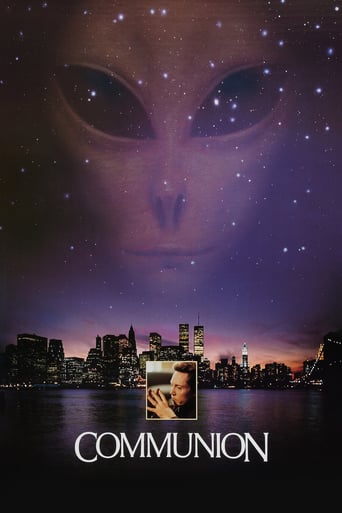

As a person who used to be very interested in UFOs and all related stories (the kind that are barely a blip on the news or TV radar these days), Communion has forever left a permeant impression on my psyche.Having read the book several times back in the day, the movie sort of follows it but takes on a life of its own. I remember seeing this for the first time and being absolutely terrified of the first time that visitor peeks its head around the door (if you don't know what I am referring to, you'll see). And while it does sort of cross over into the following book's territory, the movie is plagued by Christopher Walken's overall weirdness that prevents this from being a really good alien/horror movie.As much as I like CW's performances overall (you can never have enough cowbell after all) it just ruins what could possibly have been one of the better first hand accounts ever put to film.It's a shame that this never got the full attention it deserved. The fact that it was limited release and never really caught on was the start of the whole decline of this subject matter from the public eye.
... View MoreThis movie is just insane...I don't know were to start, its supposed to be about alien abduction but it goes beyond to weird territory, i honestly saw Chistopher Walken become Tommy Wissau in some scenes, it is so surreal you think your watching a comedy when its supposed to be science fiction, i don't know what was in the directors mind when he mixed aliens and Christopher Walken, we get one of the most insane movies ever made i don't know if to compare it with Brazil or Eraser head.Its not bad or good its in a rating limbo, you have to see it for yourself to believe what your watching and trying to make sense of it, its entertaining specially if you like strange premises, i honestly would say give it a watch and judge it for the craziness that it is
... View MoreI don't think Communion would work nearly as well, in its own sort of warped-entertaining way, without Christopher Walken. Its budget would appear to be pretty low despite the pyrotechnics and veneer of effects; watch those scenes with the aliens, as weirdly cute and obviously fake as they are, for proof of that. And other actors around him, including Lindsay Crouse as the main character's wife and their son Andrew (Joel Carson), don't impress much except in their rigid one-dimensional parts, she as the shrill wife, he the precocious/scared kid.So it falls on Walken to steal the show, and really, how could he not with this? Another actor might play Whitley Streiber- named after the author and supposedly based on the author's actual experiences with aliens- with a straight face, maybe like Richard Drefuss in Close Encounters of the Third Kind, a down-to-earth father and husband who is good to his kid (more or less) and loves his wife and has wisecracks and an original sensibility as a novelist to spare. But Walken, when he walks in (see what I did there), does his own thing with his unique, sometimes awkward and hilarious vocal inflections, and a way of looking at things that can be over the top as dead-pan, if that makes sense.Actually, to give a better example of what Walken can do here better than anyone, watch the scenes where he reacts first to the blazing lights of the alien ships (a kind of detached amusement, some interest when his son screams, and even a smirk of "hah, you don't amuse, me" to the aliens when they arrive). Then, when he's on the ship, oh boy: this is when we get to the bizarre stuff, as Walken talks to the camera ("I am me, I am here, we are all together" like in I Am the Walrus or something), or sits back reading a magazine, or has an ambiguous response to the aliens advances with shaking hands. Probing him, of course, turns out to be another matter, albeit we see this all when Whitley is under hypnosis.So a lot of this, plus some random scenes where we see Whitley's writing process writing under different characters and voices on a monitor, or those hypnosis scenes (or a classic scene where he sees everyone on a bus as a giant bug - Walken in the midst of sci-fi comedy Kafka), makes for some classic Christopher Walken bits. Hell, the guy even dances from time to time! This and a few creative touches as director from Philippe Mora help make this a kind of guilty pleasure. I can't recommend it the same way I could Close Encounters, since that one genuinely inspires and awes and gives great performances and music. This one has Eric Clapton on an off-day, low-rent alien fx and lighting cues, and it just kind of... ends really, on a note that should have been a few minutes before. But if you love Walken being "Walken", and want some cheesy alien-abduction sci-fi, you can surely look here for the goods - certainly it's a big step up from a more recent self-serious "true story" alien movie, The Fourth Kind.
... View MoreI have read the book and seen the movie and wasn't disappointed by either. I am a Strieber fan so appreciated what risks he took to write this autobiographical novel. It's true the book does have a different feel to the movie. This is mostly due, I believe to, the director Philippe Mora and Christopher Walken's quirky yet memorable acting presence.This film is very eerie, frightening, surreal and disturbing. It's not a feel-good movie but is definitely thought-provoking, just like the novel.This is definitely one of Walken's best movies. I was impressed! Also Joel Carlson does a great job as Strieber's son, Andrew. The scenes involving his son and the other dream sequences are perhaps the most disturbing.I felt empathy for Strieber in Walken's very convincing performance. I felt drawn to the character and his family.I find myself watching this film every few years and as I do it is more rewarding each time. There are some very memorable lines in this movie that will stay with you long afterwards.If you like thought-provoking, eerie, movies involving alien abduction then this may be well worth your while.
... View More